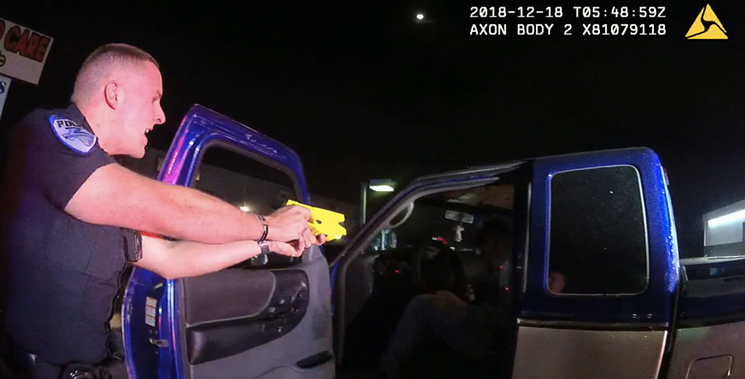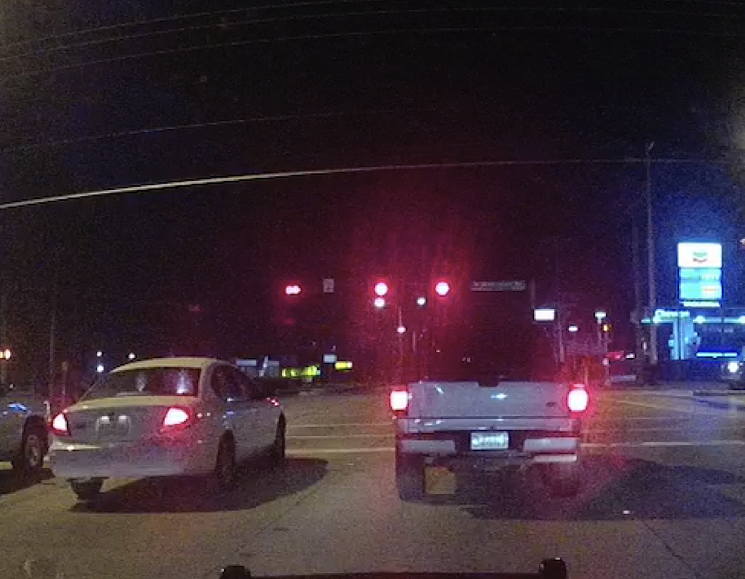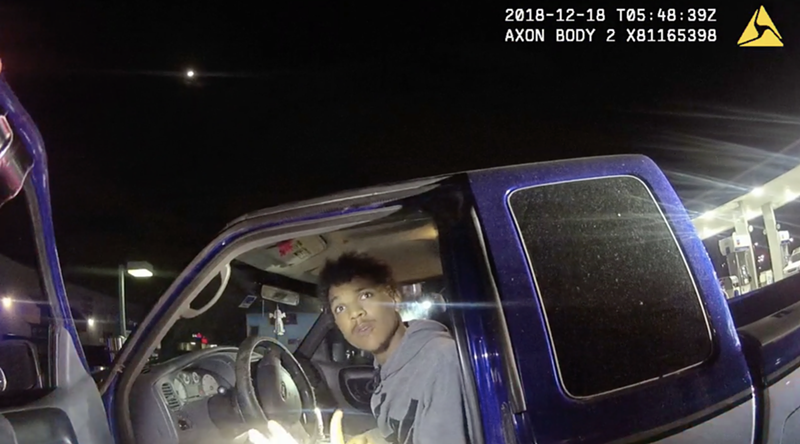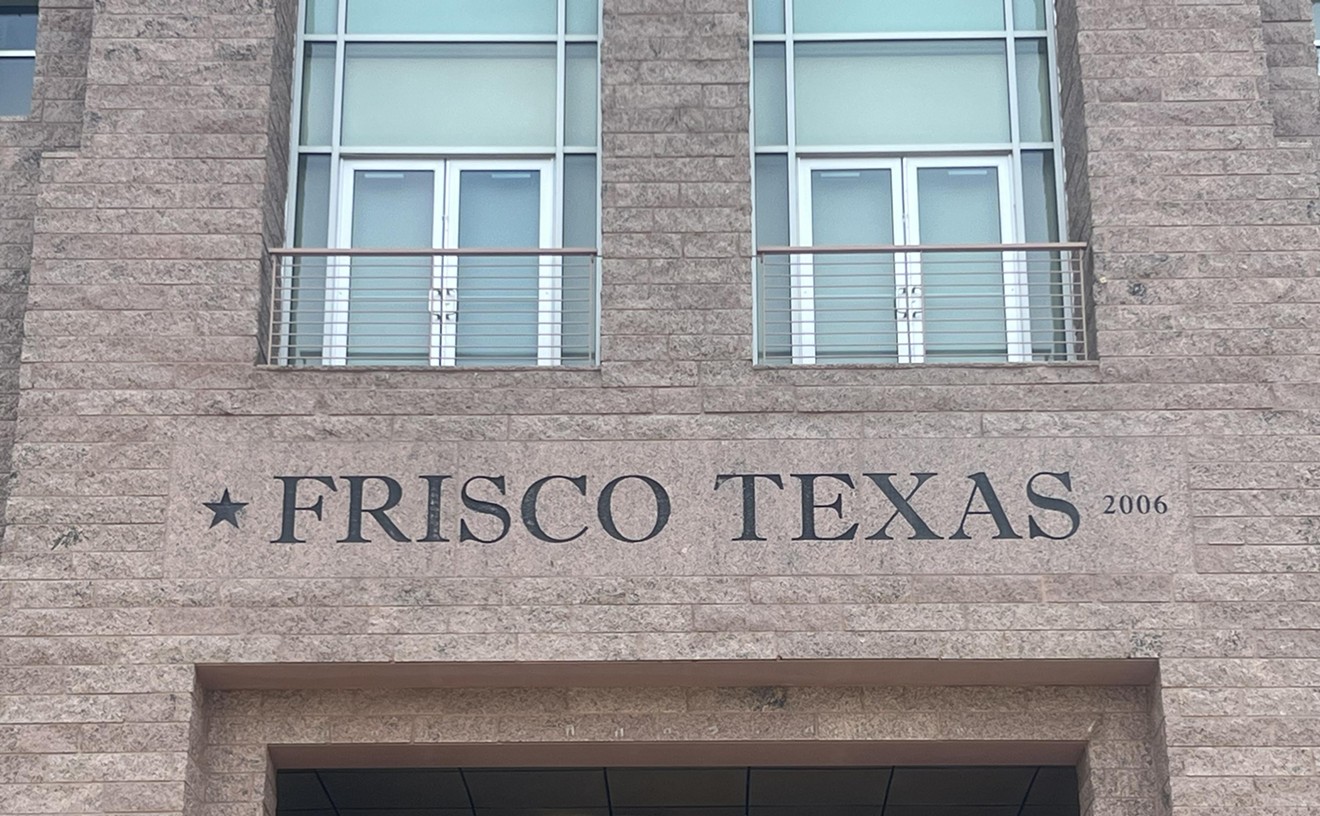“May I ask why I’m getting stopped?” Bonham asked Richardson police officer Parker Winn.
“You got a headlight out, back right —uhh — brake lights not working, and also your license plate light is out, so all three of those things,” Winn replied.
After gathering Bonham’s information, Winn asked him to step out of the car. “May I ask why?” Bonham said. Bonham asked several times, but instead of giving an answer, Winn kept demanding he get out of the vehicle, eventually using force.
Winn and the other arresting officer, Michael Cross, pulled Bonham from the car. Winn tased him and punched him repeatedly in the head, pinning him to the ground.
In a federal lawsuit against the city of Richardson and the arresting officers, Bonham and his attorney say the two cops used excessive force and the reason for the 2018 stop was bogus. Bodycam and dashcam footage from the arrest clearly refutes Winn’s claims about the broken lights on Bonham’s car.
Bonham told The Dallas Morning News, “I was scared. I felt I did everything correct.”
His attorney, Damon Mathias, said the real reason for the stop is plain and simple: racial profiling. “I believe the reason he pulled him over is he saw a young Black man driving a car,” Mathias said. Winn is a white police officer.
“The thought process, which is completely illegitimate, is ‘I’m pulling over a young Black male in a hoodie and he probably has weed in the car, so I can do what I need to do,’” Mathias said. The arresting officers found crumbles of weed at the bottom of Bonham’s backpack in a zipped plastic bag. Winn later claimed he asked Bonham to get out of his car because he smelled weed.
Some counties and cities have become more lenient about small amounts of marijuana in recent years. Dallas city officials and the police department have been discussing halting charges for misdemeanor amounts of weed in certain circumstances. In 2017, the Dallas City Council adopted a cite-and-release program that allowed officers at their own discretion to issue misdemeanor tickets to anyone caught with 4 ounces or less of cannabis.
Additionally, the Fort Worth Police Department announced it would stop citing and arresting people caught with small amounts of weed. Richardson cops, though, are still citing and arresting for pot possession.
There’s a pretty clear disparity in how these weed laws are enforced. Black people are 3.73 times more likely than whites to be arrested for marijuana and, in Texas, blacks are 2.3 times more likely than whites to be arrested for possession, according to the ACLU.“I believe the reason he pulled him over is he saw a young Black man driving a car." – Damon Mathias, attorney
tweet this
The year of Bonham’s arrest, Black people accounted for 25.4% of all traffic stops in the city of Richardson while representing 9% of the city’s population.
A spokesperson for the city of Richardson said they couldn’t comment on the specifics of Bonham’s arrest because of pending litigation. In an emailed statement to the Observer, the spokesperson said, “Overall, our police department is highly attuned to today’s important racial equity and social justice issues, and from top to bottom, we aim to be sensitive and responsive to any community concerns.”
They said city leadership works closely with the police chief “and unequivocally feels there is no systemic issue in the department with racial bias or insensitivity.”
According to court documents, however, they’re all claiming qualified immunity, a somewhat controversial legal defense that blocks government employees and officials from liability for constitutional violations. The defense only works, and it usually does, if the employees can prove they didn’t run afoul of “clearly established” law.

Neco Bonham's lawsuit describes Richardson Police Officer Parker Winn as unhinged and menacing.
Richardson Police
The only circumstance an officer doesn’t reasonably have to give a justification for asking someone to exit their vehicle is when there is some sort of danger. “[An officer] doesn’t need to be explaining why he’s pulling you out of the car if there’s some impending danger," Mathias explained.
But Mathias said the bodycam footage from the stop doesn’t indicate any impending danger to the cops. Bonham’s hands were visible and he wasn’t making any suspicious movements.
Winn could have just explained everything to Bonham, Mathias said, which could have de-escalated the situation. But Winn seemingly didn’t know any better. He would later claim that he’d never participated in de-escalation training, besides a brief session, and thought such tactics were reserved for mental health calls.
Richardson Police Sergeant Kevin Perlich said newer officers go through de-escalation training when they’re first hired. More tenured officers would go through this training during a period of the year they call “inservice,” during which they must go through several hours of training. This includes de-escalation protocols, Perlich said. According to court documents, the brief de-escalation session Winn was referring to was the training received during inservice. Perlich wouldn’t share his thoughts on whether he thinks police departments need more or less de-escalation training.
Winn moved in on Bonham and there was a quick tussle. Winn claimed Bonham hit him. Bonham denied this, but excessive force allegedly ensued.

When Neco Bonham asked why he was being stopped by police, the officer told him one of his brake lights were out. Dash camera footage from the night of the stop refutes this claim.
Richardson Police
Mathias said police departments need to focus more on de-escalation and weeding out the bad cops. In the lawsuit, Mathias argues that Winn showed a pattern of excessive force, racial profiling and escalation before stopping Bonham.
In October 2017, Winn was the subject of a disciplinary investigation because a DWI case was dismissed as a result of excessive force being used during the arrest. There are several other examples of Winn using excessive force mentioned in the lawsuit.
Also in 2017, Winn tased, punched and elbowed another individual, a “non-compliant” Black male, during an arrest, court records say. Winn and another office involved were recommended to undergo remedial training in use-of-force options. According to court documents, however, “Upon information and belief, Defendant WINN did not participate in this recommended remedial training.”
According to the lawsuit, Winn received a written reprimand for escalating the Bonham traffic stop, but he did not admit fault and said he would do it the same way again.













